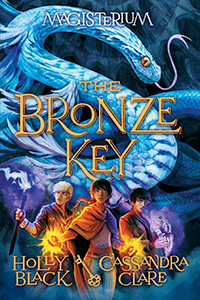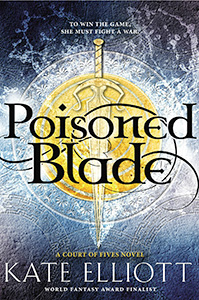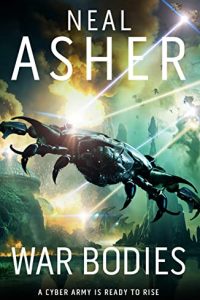Carolyn Cushman Reviews Armstrong, Black & Clare, Durst, Elliott, Evans
Michael A. Armstrong, Truck Stop Earth (Perseid Press 978-0-9975310-1-5, $25.20, 275pp, tp) July 2016.
 Michael Armstrong’s latest novel set in Alaska is science fiction – at least if you believe the narrator, who could just be extremely unreliable. James Ignatius Malachi Obadiah Osborne (call me Jimmo) is hitching ever further north when he finally ends up in Della AK. The residents there are interestingly strange, what Jimmo calls GETS (genuinely, truly strange) – the ones that aren’t alien Grays in disguise. Jimmo has been abducted, chipped in both butt and brain, and needs psychiatric drugs, though he claims they have no real effect, they’re just part of his cover as a member of the Resistance fighting the invaders and the Alien Occupation Government. He’s ex-military, and certainly has some interesting skills. He’s been avoiding the aliens, but it turns out that Della has a huge alien base hidden just outside town, and Jimmo keeps encountering aliens pretending (with mixed success) to be human. They also keep trying to kill him, but Jimmo’s decided to make a stand here in Della, though it takes him a while to figure out what to do. Meanwhile, we get lots of fascinating details about Della, meeting a lot of interesting people including a sculptor, some odd musicians, and a beachcombing writer named Max, a thinly disguised Michael A. Armstrong. (All names have been changed to protect the town, apparently.) Supposedly, Jimmo told the story to Armstrong, who said he’d ‘‘fix it up and make it semi-literate,’’ which says a lot about the story’s style. Jimmo’s quite a character; he’s not just focused on the Greys, but also spends a lot of time commenting on his erections and sexual encounters with various women. Fortunately, he’s got an amusing way of looking at things, and that keeps the story entertaining. The ultimate encounter when Jimmo kicks the aliens’ asses was a bit of a letdown, but overall this is a great, goofy tale with some delightful local color.
Michael Armstrong’s latest novel set in Alaska is science fiction – at least if you believe the narrator, who could just be extremely unreliable. James Ignatius Malachi Obadiah Osborne (call me Jimmo) is hitching ever further north when he finally ends up in Della AK. The residents there are interestingly strange, what Jimmo calls GETS (genuinely, truly strange) – the ones that aren’t alien Grays in disguise. Jimmo has been abducted, chipped in both butt and brain, and needs psychiatric drugs, though he claims they have no real effect, they’re just part of his cover as a member of the Resistance fighting the invaders and the Alien Occupation Government. He’s ex-military, and certainly has some interesting skills. He’s been avoiding the aliens, but it turns out that Della has a huge alien base hidden just outside town, and Jimmo keeps encountering aliens pretending (with mixed success) to be human. They also keep trying to kill him, but Jimmo’s decided to make a stand here in Della, though it takes him a while to figure out what to do. Meanwhile, we get lots of fascinating details about Della, meeting a lot of interesting people including a sculptor, some odd musicians, and a beachcombing writer named Max, a thinly disguised Michael A. Armstrong. (All names have been changed to protect the town, apparently.) Supposedly, Jimmo told the story to Armstrong, who said he’d ‘‘fix it up and make it semi-literate,’’ which says a lot about the story’s style. Jimmo’s quite a character; he’s not just focused on the Greys, but also spends a lot of time commenting on his erections and sexual encounters with various women. Fortunately, he’s got an amusing way of looking at things, and that keeps the story entertaining. The ultimate encounter when Jimmo kicks the aliens’ asses was a bit of a letdown, but overall this is a great, goofy tale with some delightful local color.
Holly Black & Cassandra Clare, The Bronze Key (Scholastic Press 978-0-545-52231-1, $17.99, 249pp, hc) August 2016. Cover by Alexandre Chaudret.
 The third book in the middle-grade Magisterium series finds Callum and Aaron at the end of summer, about to be honored as heroes for defeating Constantine Madden, AKA the Enemy of Death. (He’d been dead for years, but no one knew that until Call brought back his severed head.) It’s still a secret that Constantine’s soul is inside Call; only his closest friends know. But at the ceremony honoring the boys, it starts to look like someone is trying to kill Call. Back in school for the youngsters’ third year, the adults are trying to figure out who the assassin/spy might be, but Call, Aaron, and their buddy Tamara are not convinced the teachers are doing enough. Of course, the kids get into trouble when they try to investigate for themselves, and none of their efforts get useful results. At the very end, things go terribly wrong, which at least promises some interesting developments in the next book. For the most part, though, the current volume just marks time with a series of unproductive little adventures until the final confrontation and revelations.
The third book in the middle-grade Magisterium series finds Callum and Aaron at the end of summer, about to be honored as heroes for defeating Constantine Madden, AKA the Enemy of Death. (He’d been dead for years, but no one knew that until Call brought back his severed head.) It’s still a secret that Constantine’s soul is inside Call; only his closest friends know. But at the ceremony honoring the boys, it starts to look like someone is trying to kill Call. Back in school for the youngsters’ third year, the adults are trying to figure out who the assassin/spy might be, but Call, Aaron, and their buddy Tamara are not convinced the teachers are doing enough. Of course, the kids get into trouble when they try to investigate for themselves, and none of their efforts get useful results. At the very end, things go terribly wrong, which at least promises some interesting developments in the next book. For the most part, though, the current volume just marks time with a series of unproductive little adventures until the final confrontation and revelations.
Sarah Beth Durst, The Queen of Blood (Harper Voyager US 978-0-06-241334-5, $19.99, 350pp, hc) September 2016. Cover by Stephan Martiniere.
 The first book in the Queens of Renthia series introduces a fascinating world where spirits co-exist unwillingly with humans, their vicious tendencies held in check only by the human queen’s order to ‘‘Do no harm.’’ The spirits – of water, fire, ice, air, earth, and trees – are tricky, so children are taught early to avoid attracting their attention. The land of Aratay is supposed to be as safe as any place can be, but somehow ten-year-old Daleina’s village is destroyed, her family among the very few survivors, saved when Daleina unexpectedly shows the affinity: the ability to influence spirits. She starts training to use the ability with a local hedgewitch, then, when older, heads to Northeast Academy, always aware her control over spirits isn’t the best, but wanting to help prevent further deaths. Meanwhile, a disgraced champion is traveling the country, trying to find out why the occasional slaughter occurs, and stop it. The story mixes a ‘‘magic school’’ environment – not as fun as Harry Potter, but at least we get to know the girls who might be the next queen – with lots of action. Training with spirits gets tense, and the storytelling’s taut; I’d have appreciated a little comic relief to balance Daleina’s struggles and self-doubt. Regardless, the story is powerful right up to the ending, which came as a huge surprise, leaving even more interesting times to come in the next installment.
The first book in the Queens of Renthia series introduces a fascinating world where spirits co-exist unwillingly with humans, their vicious tendencies held in check only by the human queen’s order to ‘‘Do no harm.’’ The spirits – of water, fire, ice, air, earth, and trees – are tricky, so children are taught early to avoid attracting their attention. The land of Aratay is supposed to be as safe as any place can be, but somehow ten-year-old Daleina’s village is destroyed, her family among the very few survivors, saved when Daleina unexpectedly shows the affinity: the ability to influence spirits. She starts training to use the ability with a local hedgewitch, then, when older, heads to Northeast Academy, always aware her control over spirits isn’t the best, but wanting to help prevent further deaths. Meanwhile, a disgraced champion is traveling the country, trying to find out why the occasional slaughter occurs, and stop it. The story mixes a ‘‘magic school’’ environment – not as fun as Harry Potter, but at least we get to know the girls who might be the next queen – with lots of action. Training with spirits gets tense, and the storytelling’s taut; I’d have appreciated a little comic relief to balance Daleina’s struggles and self-doubt. Regardless, the story is powerful right up to the ending, which came as a huge surprise, leaving even more interesting times to come in the next installment.
Kate Elliott, Poisoned Blade (Little, Brown 978-0-316-34437-1, $17.99, 468pp, hc) August 2016.
 Non-stop danger keeps things moving in this second book in the Court of Fives series. Jessamy hates Lord Gargaron, who owns the ‘‘stable’’ where she trains to compete in the Court of Fives. He destroyed her family so her father, a brilliant general, would leave the Efean mother of his daughters and instead marry Gargaron’s niece – who has some dark secrets of her own, Jessamy learns. The country is currently being invaded, so Jessamy’s father and the prince Jessamy’s attracted to are both off to war. Meanwhile, Lord Gargaron is heading off on a tour of his properties, and he takes Jessamy and others from his stable to show off their talents along the road. But the war is getting closer than expected, and treachery, treason, and rebellion are brewing. The intrigue and threats never let up, and Jessamy is constantly doing things that ought to get her or her family in great trouble. Since this is a middle novel in a series, it’s to be expected that things get steadily worse, and at least by the end there are hints this might be the chance the long-suppressed Efeans need to take their country back.
Non-stop danger keeps things moving in this second book in the Court of Fives series. Jessamy hates Lord Gargaron, who owns the ‘‘stable’’ where she trains to compete in the Court of Fives. He destroyed her family so her father, a brilliant general, would leave the Efean mother of his daughters and instead marry Gargaron’s niece – who has some dark secrets of her own, Jessamy learns. The country is currently being invaded, so Jessamy’s father and the prince Jessamy’s attracted to are both off to war. Meanwhile, Lord Gargaron is heading off on a tour of his properties, and he takes Jessamy and others from his stable to show off their talents along the road. But the war is getting closer than expected, and treachery, treason, and rebellion are brewing. The intrigue and threats never let up, and Jessamy is constantly doing things that ought to get her or her family in great trouble. Since this is a middle novel in a series, it’s to be expected that things get steadily worse, and at least by the end there are hints this might be the chance the long-suppressed Efeans need to take their country back.
Sandra Evans, This Is Not a Werewolf Story (Atheneum 978-1-4814-4480-4, $16.99, 336pp, hc) July 2016. Cover by Maike Plenzke.
 Despite the title, this intriguing first novel really is a sort of werewolf story for middle-grade readers. It starts out with a bang as a humorous boarding school tale, with a wild new boy facing off against Coach Tuffman, the sort of coach you love to hate. Pretty soon, though, a sense of threat develops. The focus of the story is the narrator, Raul, a quiet kid who keeps an eye on things at the school. The school only boards kids during the week, but his dad has stopped coming to pick him up over the weekends, so Raul pretends to walk out to meet his dad, then spends his weekend in the nearby woods – as a wolf. But other predators are turning up, and Coach Tuffman is acting oddly towards Raul, alternately threatening and strangely friendly. The new kid acts strange, too. Raul has some odd ideas about what’s going on, and he gets into some serious trouble before he can figure out exactly what it is, and what to do about it all. It’s a quirky tale, based loosely on Marie de France’s medieval story ‘‘Bisclavret’’, occasionally a bit confusing but rewarding in the end.
Despite the title, this intriguing first novel really is a sort of werewolf story for middle-grade readers. It starts out with a bang as a humorous boarding school tale, with a wild new boy facing off against Coach Tuffman, the sort of coach you love to hate. Pretty soon, though, a sense of threat develops. The focus of the story is the narrator, Raul, a quiet kid who keeps an eye on things at the school. The school only boards kids during the week, but his dad has stopped coming to pick him up over the weekends, so Raul pretends to walk out to meet his dad, then spends his weekend in the nearby woods – as a wolf. But other predators are turning up, and Coach Tuffman is acting oddly towards Raul, alternately threatening and strangely friendly. The new kid acts strange, too. Raul has some odd ideas about what’s going on, and he gets into some serious trouble before he can figure out exactly what it is, and what to do about it all. It’s a quirky tale, based loosely on Marie de France’s medieval story ‘‘Bisclavret’’, occasionally a bit confusing but rewarding in the end.




